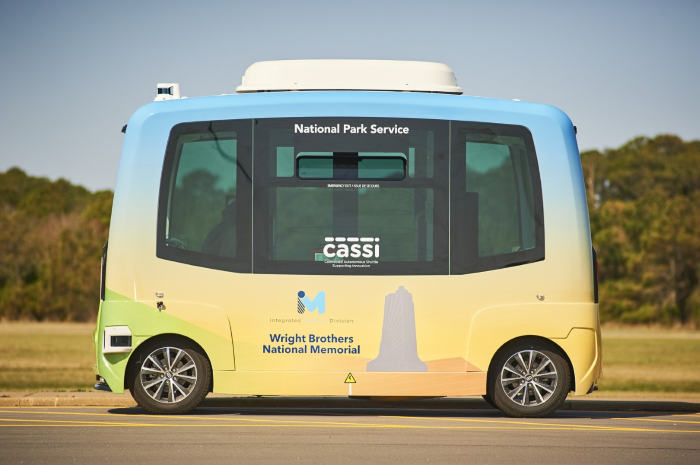The North Carolina Department of Transportation (NCDOT) and the National Park Service (NPS) have launched what they claim is the first self-driving vehicle to be tested at a recreational public lands site in the USA.
Fittingly, the Connected Autonomous Shuttle Supporting Innovation, or CASSI, was launched at the Wright Brothers National Memorial in Kill Devil Hills – the site of the world’s first powered flight.
“This is a huge day for transportation,” said Eric Boyette, the state’s transportation secretary. “We’ve come such a long way since the Wright Brothers made their first historic flight here more than a century ago. Just like that milestone, we think the CASSI represents the start of another revolution for transportation.”
The CASSI will help the NPS and NCDOT learn more about how driverless vehicles can be safely and effectively used in the future. The vehicle will be tested at the Wright Brothers National Memorial for three months.
“Wright Brothers National Memorial is excited about building upon the Wright brothers’ legacy of transportation innovation through this first-of-its-kind shuttle demonstration and through a successful partnership with NCDOT,” said David Hallac, superintendent, National Parks of Eastern North Carolina. “This exploratory initiative will inform the park service’s use of autonomous transportation systems in the future.”
During the pilot, a trained customer service operator will ride in the vehicle to ensure the safety of passengers. The operator will monitor conditions and be able to manually stop the vehicle at any time.
The vehicle will navigate its route using lidar and GPS to map and then monitor a fixed route, with sensors continuously scanning the shuttle’s surroundings, signalling it to stop when an obstacle is too close. The NCDOT is working with TransLoc to provide real-time tracking software and a map to keep riders updated on CASSI’s location on NCDOT’s website.
During the pilot, information will be collected about the number of passengers, trips and the vehicle’s battery usage. NCDOT and NPS will use the data to better understand how autonomous vehicles perform in different settings.
Rides are free, however, the number of passengers will be limited due to the size of the vehicle and space limitations due to Covid-19. The vehicle operates at speeds between 8mph and 12mph. The NCDOT is leasing the vehicle from EasyMile.
Beep deploys autonomous shuttles at Yellowstone National Park
Meanwhile, Beep, a Florida-based autonomous Mobility as a Service (MaaS) provider, has begun initial deployment of its first autonomous shuttles at Yellowstone National Park with the National Parks Service (NPS). The pilot program will test multi-passenger, electric automated vehicle platforms to provide visitors a safe, innovative and eco-friendly transportation alternative while exploring Yellowstone.
During the deployment, Beep will provide a full suite of services for the pilot including the autonomous vehicles, engineering and mapping of the routes and complete operational, monitoring and management for regular oversight and to support ridership demand. The pilot will be supported and monitored by an onboard shuttle specialist, on-the-ground staff and Beep’s Global Command Center to ensure safe and reliable operation.
Beep claims “a perfect safety record”, having run the largest and longest single-site AV shuttle fleet in the USA, located in Lake Nona, Florida, a 17 square-mile planned development in Orlando, since September 2019. It safely transported over 16,000 passengers in its first year of operation on its initial route eliminating the equivalent of nearly 9,400 vehicle trips with carbon emissions that would have required 170 trees to reverse. Beep is also the first AV service provider currently participating in NHTSA’s AV TEST Initiative public portal, launched in June 2020.


